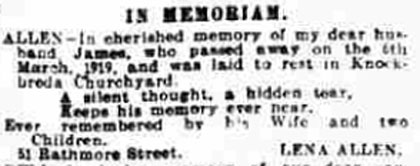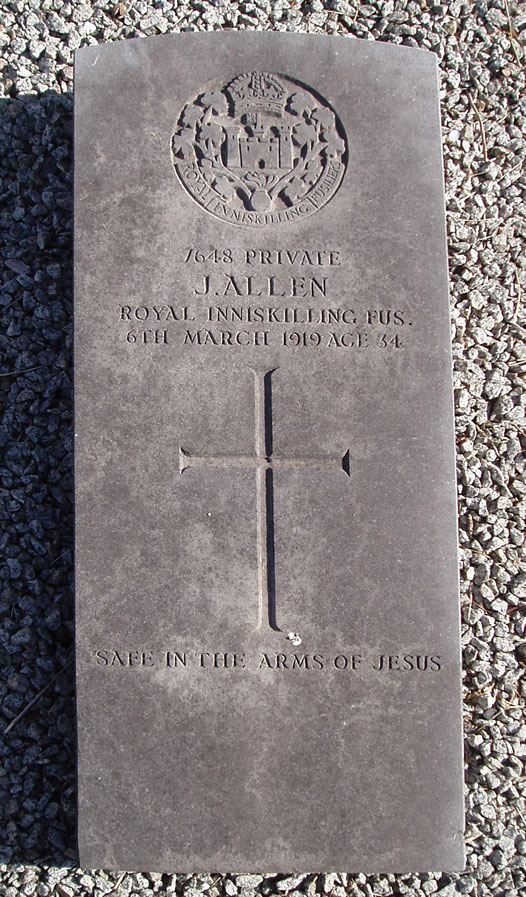![]() In memoriam
In memoriam ![]()
Private James Allen
James Allen was born on 23 June 1884 in Brook Street, Coleraine, County Antrim, the second of nine children of plumber James Allen and his wife Ellen (née McKay). Soon after, the family moved to Limavady, and around 1892, to Belfast. In August 1897 his mother died of typhoid fever and his father, having remarried, died of nephritis in June 1903. By 1909 James had also lost three of his sisters and his two half-siblings.
Allen worked as a labourer until 24 April 1903, when he enlisted at Belfast in the Royal Inniskilling Fusiliers (No.7648). Posted to the 1st Battalion, he was rarely out of trouble, being disciplined six times in 1903 and 1904 for offences ranging from absence, losing articles of clothing, making an improper reply to an NCO, being drunk in barracks, resisting an escort, damaging a rifle, and 'using party expressions'.
On 24 September 1904 Allen was posted to the 2nd Battalion and embarked for Egypt. While serving at Cairo his poor disciplinary record continued, including being drunk and improperly dressed, creating a disturbance, and 'commiting a nuisance on the company veranda'. He returned home on 15 March 1906 and the following month was transferred to the Army Reserve.
On 22 December 1906 he married Lena Swan at the Belmont Presbyterian Church, Holywood, County Down. The couple's two children were born over the next three years. At the time of the 1911 Census they were living at 89 Mount Street, Belfast, James working as a motorman.
Allen was mobilised on the declaration of war at the beginning of August 1914, reporting for duty with the Royal Inniskilling Fusiliers at Omagh. He soon fell ill, however, a medical board Londonderry on 25 August finding he was suffering from tuberculosis of the lung.
Thin, more of less emaciated ... Man had been when in civil life exposed to cold & wet and contracted lung trouble. Does not appear to have been caused in any way by military service.
On 21 September 1914 he was discharged, being medically unfit for war service (paragraph 392(xvi), King's Regulations). He was not granted a disability pension, as the illness was considered to be unrelated to his military service.
Less than a fortnight later, on 3 October 1914, Allen enlisted in the North Irish Horse at Belfast (No.1259). He gave his address as 79 Rathmore Street, Belfast, and his place of birth as Willowfield, Belfast. Understating his age by a year, he made no reference to his previous military service. The record of his physical description noted that he had a number of tattoos, including 'King William III 1690'.
Allen embarked for France on 9 February 1915 with a reinforcement draft for A and C Squadrons – he was probably posted to the latter, which soon after was attached as divisional cavalry to the 3rd Division. In June 1916 C Squadron combined with F Squadron and the 6th (Inniskilling) Dragoons Service Squadron to form the 2nd North Irish Horse Regiment, serving as corps cavalry to X Corps.
In October 1916 Allen fell ill and was evacuated to England, where he was admitted to the Dudley Road Hospital in Birmingham. His health improved and on 24 April 1917 he re-embarked for France, though not before he had again been disciplined for being absent without leave.
Soon after, however, he fell ill due to the tuberculosis. Admitted to No.32 Stationary Hospital at Wimereux on 13 May, a week later he was evacuated to the UK and admitted to a military hospital in York, where he remained under treatment. On 4 August he was awarded 21 days' detention and ordered to forfeit 22 days' pay for being absent without leave from 9 to 30 July.
On 30 August Allen was transferred to the Royal Irish Rifles (No.20220) and posted to the 3rd (Reserve) Battalion. His health, however, continued to deteriorate. On 13 December 1917 a medical board reported that the disease had originated in December 1916 at St Omer:
He was sent home but sent back to France the following April. He [became] ill again in June 1917 was sent home and has been in hospital ever since.
The board recommended that he be discharged as permanently unfit, the result of 'exposure on active service'.
Allen was discharged on 4 January 1918, being 'no longer physically fit for war service' (paragraph 392(xvi), King's Regulations). His military character was recorded as 'good'. As his illness was now attributed to his military service, Allen was awarded a pension, his level of disability assessed at 50 per cent. By the end of the year, however, this had increased to 100 per cent.
Allen died at his home at Rathmore Street on 6 March 1919. He was buried in the Knockbreda Cemetery, Belfast, grave B.370. Because his death was attributed to his military service he was recognised as a casualty of the war, but with his regiment, incongruously, the Royal Inniskilling Fusiliers, rather than the North Irish Horse or Royal Irish Rifles. The inscription on his gravestone reads:
7648 PRIVATE
J. ALLEN
ROYAL INNISKILLING FUS.
6TH MARCH 1919 AGE 34
SAFE IN THE ARMS OF JESUS

Belfast Telegraph, 6 March 1925
At least one of Allen's brothers, Robert, also served in the military, in the Royal Navy from 1903 to 1921.
Gravestone image kindly provided by Steve Rogers of The War Graves Photographic Project.

